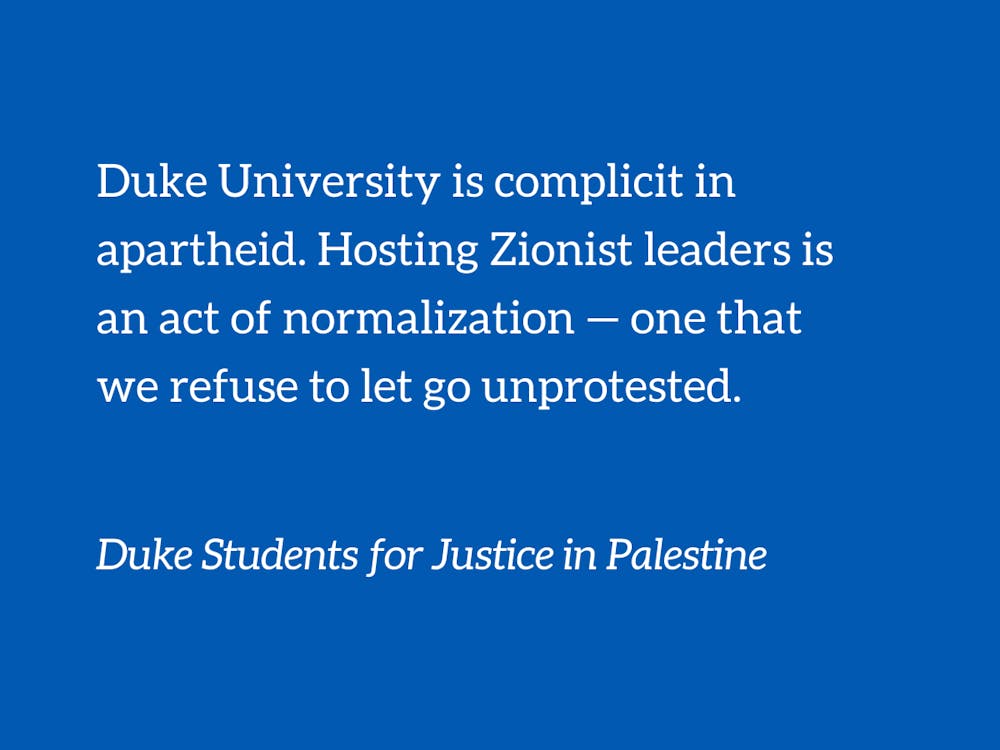On March 22, we walked out of a Duke event featuring former Israeli Prime Minister Naftali Bennett. Hosting Bennett on campus was a shameless attempt to normalize Israeli apartheid.
In a Chronicle column published before the event, Duke professors Abdullah Antepli and David Schanzer trivialized potential protests against the Israeli occupation of Palestine, describing protestors as simply “hostile to Israel.” Promising that “meaningful dialogue” would reward attendees who endured Bennett’s circuitous speeches, the professors discouraged “boycotting, heckling or walking out.” The only “meaningful dialogue” offered to those who remained, though, was facilitated via pre-written vetted questions scrawled on index cards.
Bennett is cast as a moderate politician who championed diversity and democracy while in office, despite his demonstrated record of far-right policies. If you so much as criticize Bennett or Israel’s human rights abuses, you are quickly deemed overly zealous — or worse, sympathetic to terrorist organizations.
Supporters of the Palestinian cause are not and never have been included in the “meaningful dialogue” Antepli and Schanzer champion. Silent participation condones our university’s complicity in Israeli apartheid.
Walking out has long been a strategy for students to oppose institutional complicity and protest for social change. Mexican American students in Los Angeles walked out in the 1960s to advocate for Civil Rights, college students walked out in the 1970s to protest the Vietnam War, and more recently in 2018, high school students walked out to protest inaction on gun violence.
Changing the conversation
Palestinians have been living under Israeli military occupation for more than 75 years. Between 1947 and 1949, Zionist forces expelled more than 750,000 Palestinians from a population of about 1.4 million. Since its establishment in 1948, the Israeli state has continually ethnically cleansed Palestinian inhabitants to further its settler colonial objectives.
Zionism aims to establish a Jewish-majority state in Palestine. An ethnocratic state like Israel can only thrive with an infrastructure that continually removes non-Jewish inhabitants. Consequently, Israel has continued to expand settlements; as of 2021, 700,000 Israeli settlers had entered the West Bank and East Jerusalem. This practice, deemed illegal under international law, entails the violent expulsion of countless Palestinian families and their replacement by Israeli settlers.
In recent years, Israeli authorities have doubled down on the illegal occupation and settlement of the West Bank and the inhumane blockade of the Gaza Strip. Naftali Bennett, self-described as “more right-wing” than Benjamin Netanyahu, is but one actor in the larger Zionist settler colonial project. His ultra-nationalism should concern even the most centrist American political pundits.
Duke University is complicit in apartheid. Hosting Zionist leaders is an act of normalization — one that we refuse to let go unprotested.
In their column, Antepli and Schanzer posit that protest actions are “empty gestures that will aid Palestinians not one iota.” Yet allowing Bennett to spout untruths and ignore damning facts with little to no pushback actively hurts the Palestinian cause by propagandizing the American public.
Instead of recognizing how this event could traumatize Duke’s Palestinian and Arab student population, the university warmly welcomed Bennett, who is responsible for the deaths of 102 innocent Lebanese civilians in 1996. The same man who reportedly once said: "I’ve killed lots of Arabs in my life — and there’s no problem with that.”
Bennett has spent his career promoting illegal settlements, disguising the violent occupations as innocent infrastructure projects. Between 2010 and 2012, he directed the Yesha Council, a coalition of municipalities in illegal settlements across the West Bank.
Bennett’s propaganda actively distorts the reality of Israeli military occupation. During the event, for example, he lamented Gaza’s failure to become “the Singapore of the Middle East,” belying his own role in holding Gaza under a brutal military blockade since 2007.
Bennett’s actions warrant protest. Direct activism by Palestinians and their supporters via social media has arguably begun to shift public opinion in ways that could significantly alter the U.S.-Israeli relationship. Internationally, the Boycott, Divestment, and Sanctions movement is forcing global actors to question their complicity in Israel's military aggression toward Palestinians.
Truth is truth, loud or soft
“Screaming is not the best method,” Bennett said during the event. “... I respect those folks’ right to demonstrate … [it’s] part and parcel of a vibrant democracy. But does that change anyone's mind? No.”
However, protests — loud and uncomfortable — have historically forced laws to change. Facts are still true whether one screams or whispers them.
A state that denies a people’s right to self-governance can hardly be called a “vibrant democracy,” and Israel’s supporters worldwide seem to be waking up to that fact. A reminder, more than 4.5 million Palestinians have no electoral say in choosing the government that dictates their lives.
Our act of protest is justified. We aim to counter the widely propagandized Zionist narrative — a narrative that erases the Palestinian people and their struggle for liberation. We encourage our fellow students to step off the sidelines and join the movement for justice in Palestine.
Get The Chronicle straight to your inbox
Sign up for our weekly newsletter. Cancel at any time.
Duke Students for Justice in Palestine, is a coalition advocating to end the Israeli occupation of Palestine. They seek to accomplish this mission by educating the Duke community about the illegitimacy and dehumanizing conditions of Israeli apartheid and by promoting the activist tools necessary to oppose it.

